- Engineering
- 12 min read
- January 2021
DevSecOps: A growing segment for security enhancement in organizations
There is a very peculiar connection between the world's immensely successful companies like Amazon, Google, Esty, Target, Walmart, and Netflix. They all have implemented DevOps in their daily business process. The result? They have realized better efficiency and an improved delivery time. With this article, our target is to help you understand DevOps and showcase its importance in making your business a success.
DevSecOps for Enterprises
Let’s create a hypothetical situation to delve deeper into this.
You are a startup that deals with developing AI fuel gauges for the petrochemical industry.
- One team of developers is assigned with the task of writing and executing codes for creating bots.
- Another team with operations is tasked with maintaining the entire bot infrastructure and providing end-user support.
The time taken by the development team for creating the latest bot was ten months. It recognizes people, and their commands are integrated with smart speakers (AI Assistant-enabled) and do the work they were created for. The dev team has done everything in a controlled environment where everything is running smoothly.
Now they hand it over to their operations counterparts responsible for taking the creation out to the real world. It is going to be tested for the time, courtesy of the end-users. This is where the problems start surfacing. The latest bot that your dev team put in so much time and effort to develop, it's broken. You come to know that it
- breaks down while trying to figure out commands from multiple people
- has a hard time recognizing the commands from smart speaker devices
- is not precise to the last cubic calculations
The commotion and disappointment are visible amongst the operations and development team. The operations team’s disappointment is valid; they waited so long for this bot. The dev team is defending their creation as they tested everything on their end, and it worked just fine. They start questioning the execution of the entire operations team.
But this is the short picture. As a business, you now have unhappy clients who don’t know how your sub-optimal product will help them gain forecasted profits.
To conclude this hypothetical situation, you will need more time to correct the code. This means the ‘refurbished’ bot will now take more time to roll out. Plus, there is a built-up tension between the most productive and competent teams in your organization.
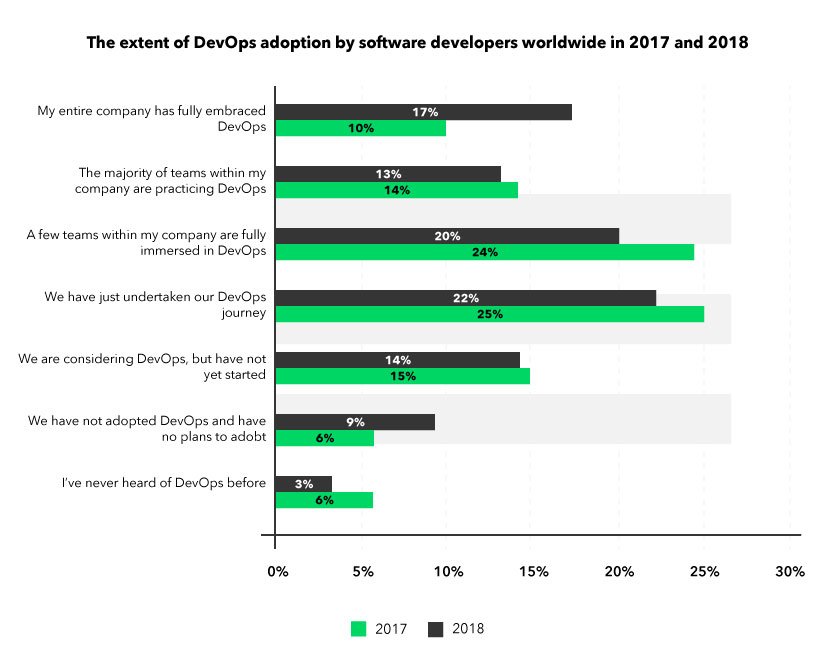
This is why businesses are looking forward to adopting DevOps as it emphasizes streamlining their entire processes across the pipeline. Doing so allows companies to
- have consistent development
- faster testing cycles
- release a working model
Businesses can configure their DevOps tools and automation to make their developers self-sufficient and carry out their work with access controls and better compliance.
Now coming to the original question, what is DevOps?
Let us again take the example mentioned above to provide you with the meaning of DevOps. It is a simple fact that both the dev and ops teams will need to put in more hours to make their product market-ready. They will have to go through many iterations and need to move the bot between themselves as the ops team will run it in the real world. This makes the startup inefficient, slow, and not to mention, even lose their clients.
Businesses started realizing the amount of loss they were making due to this simple overlook. They kept their teams isolated, directly resulting in slower product delivery and offerings that were not ready for the market. The reason businesses started adopting DevOps is that it also brings a lot of automation to the process and enables them to gain a much-needed competitive edge in their respective market.
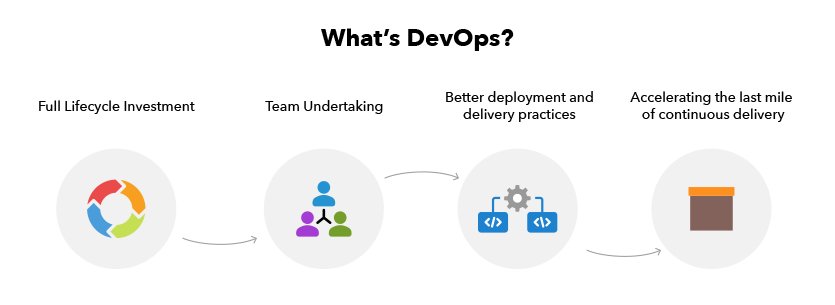
The design of DevOps starts from the development process to production support. It merges Development and Operations and fuses their combined efforts to achieve efficiency and automation, and security.
The evolution of DevOps
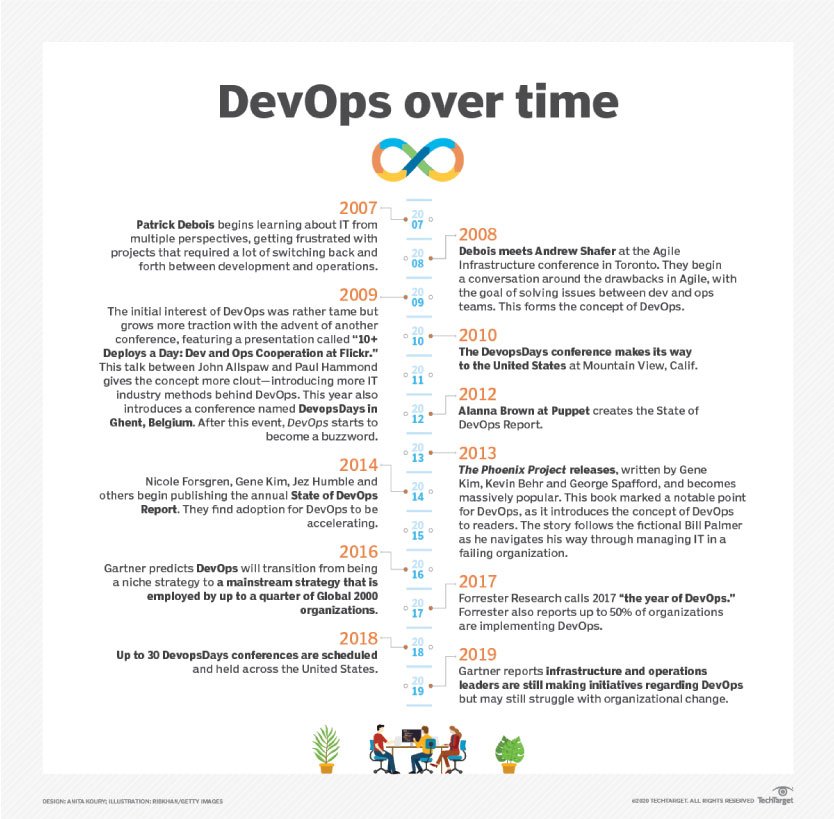
In 2007, Patrick Debois, a project manager by profession, started working with the Belgian government for data center migrations. The process was tedious and extremely frustrating as the developers and operations' isolated team made the entire process slower.
Debois had an excellent experience with agile methodology and believed that it should make these isolated teams work synchronously.
In 2007, a project manager named Patrick Debois was working with the Belgian government to help with data center migrations. He found the whole process extremely frustrating because of the wall between the developers and the operations team, making his job much harder and delivery much slower.
In 2008, Andrew Schafer and Debois got together at a conference where they discussed initial ideas and principles, referred to as “agile systems administration.” After forming an agile administrator group on Google, this is where DevOps got its origin.
In 2009, Flickr employees John Allspaw (then VP of technical operations) and Paul Hammond (then Director of Engineering) showcased the business loss caused due to the scattered way development and operations work with the help of a now-famous presentation at the O’Reilly Velocity conference. This was the defining moment for DevOps; after this, Debois organized a DevOps conference known as Devopsdays in Belgium. The rest is history.
After a decade, DevOps has become more than a philosophy. From being a mix of ideas and principles, it now has its process and tools.
How DevOps helps business organizations?
DevOps has seen a rapid adoption rate because it makes a massive difference in how a tech company operates. This section will discuss some of the benefits that tech companies can have after adopting DevOps.
1. Fast-tracked innovation
Innovation is the reason behind DevOp’s existence. With the help of DevOps, tech firms can
- develop and deploy their digital products at a much faster rate
- achieve reduced cycle times
- make software changes easily
- take complete ownership of projects and deliver them with the help of microservices and continuous delivery
2. Better collaboration
We already set up that the silos of the dev and operations team create mistrust, and they work in the blind. With the adoption of DevOps, businesses can see better collaboration between the two previously isolated teams. This also results in a more positive working environment where the results are achieved with more efficiency.
3. More reliable digital products
When DevOps was not implemented in the development process, businesses lost users due to poorly executed software updates. DevOps has brought continuous integration and delivery to the development process, where it is easy to test the software’s functionality while also keeping security and quality in mind. Constant monitoring and logging allow the teams to track the real-time performance metrics and build more reliable products.
4. Upgraded security
Now teams can implement DevOps and use
- automated compliance policies
- fine-grained controls
- configuration management techniques
This allows businesses to maintain a faster product development cycle without compromising on safety.
5. A business that scales with DevOps
With the big guns like Google, Amazon, YouTube, etc., banking on DevOps for automation, consistency, and scalability, many enterprises have realized its importance. The same automation and consistency allow DevOps to manage and change complex systems with ease and better efficiency.
The best practices for effective DevOps
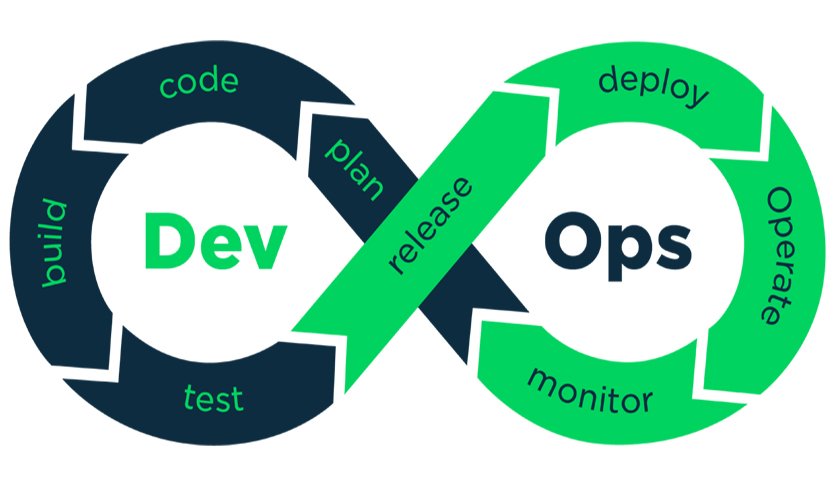
Although different industries have different uses and meanings for DevOps, there has been a massive uptrend in adopting this technology. This section will discuss some of the best practices that companies must adhere to adopting DevOps.
1. Participation from stakeholders
DevOps application for your business will be most effective only when developers, operations, and support staff collaborate and use an integrated approach towards achieving the business goals.
2. Automated regression test
Agile teams generally use the automated regression test to help them fix problems at a much faster rate for publishing quality codes. This is the same with DevOps because the operations teams need high-quality codes to test it out in real-world scenarios.
3. Integration of configuration management
When we talk of the DevOps environment, configuration management is applied to the current solution and configuration issues between the solution and the rest of the organizational infrastructure. With DevOps technology’s help, integrated configuration management helps operations teams see the new release’s impact with more clarity.
4. Integration of change management
Operations and development teams work coherently towards understanding the use and impact of various technologies. After this overview,y then move towards managing these technologies to achieve the business goal.
5. Making fair use of continuous integration
Using continuous integration, developers can test the codes and analyze updated code in the version control system. Such a process allows immediate feedback to the developers to develop a high-quality solution with minimal risk.
6. A better-integrated deployment planning
With DevOps, operations engineers can get closely involved with the development team for planning the deployment of products as per the deployment schedule.
7. A more continuous deployment
By using continuous deployment, the operations team can move one successful sandbox integration to another. They can continue this process through the human verification stage resulting in a successful dev to operations transition of the recently built code.
8. Production Support
When tech companies implement DevOps technology in the business process, they enable their developers to work simultaneously on new releases and address the older solution's issues. This does help because it allows developers to get an insight into the problems that production teams face, allowing them to develop a solution with fewer issues in the first place.
9. Monitoring the application
In this practice, solutions in the production phase are monitored and logged in real-time. With this practice’s help, tech firms can gain insight into their solution's performance metrics, improve its reliability, and prevent unnecessary failures.
10. Creating automated dashboards
Dashboards are a necessity for deriving various essential metrics for businesses. DevOps enables businesses to create automated dashboards. Yes, it is impossible to automate every metric, but they can still monitor many essential metrics in real-time with automated dashboards. These metrics are also critical for gaining profitable business intelligence.
The DevOps tools that help in its practical implementation
A linked toolchain of technologies has now become critical if DevOps is to bring about the change it’s meant to - Gartner
Specific tools automate and facilitate DevOps processes and help implement the above-mentioned best DevOps practices. Having the right tools is crucial to DevOps implementation. DevOps was not originally developed with the idea of having tools for its successful adoption and run; numerous technologies became integral to DevOp's success with its evolution.
This section will share some examples of these technologies differentiated by the stages / best practices mentioned previously.
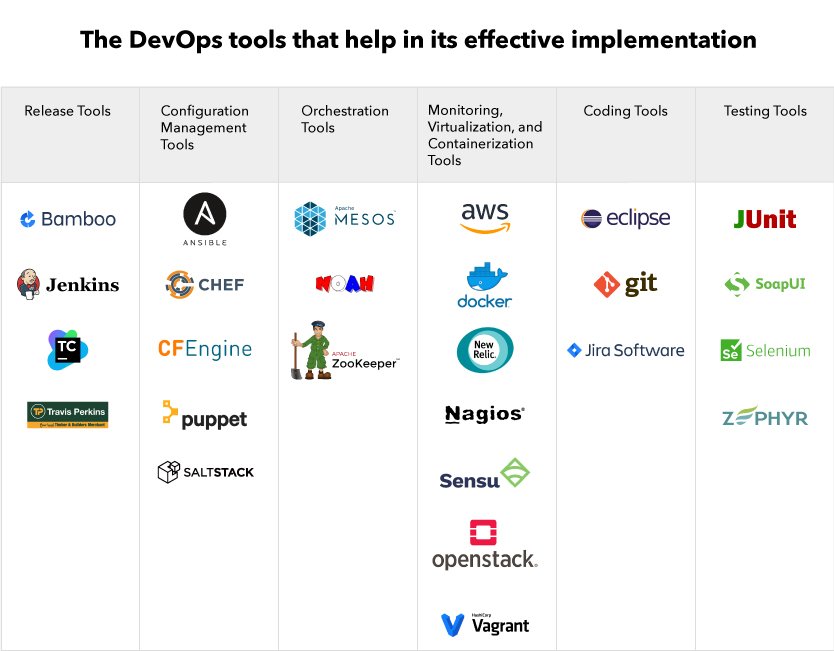
Release Tools
- Bamboo
- Jenkins
- TeamCity
- Travis
Configuration Management Tools
- Ansible
- Chef
- Cfengine
- Puppet
- Saltstack
Orchestration Tools
- Mesos
- Noah
- Zookeeper
Monitoring, Virtualization, and Containerization Tools
- AWS
- Docker
- New Relic
- Nagios
- Sensu
- Spunk
- OpenStack
- Vagrant
Coding Tools
- Eclipse
- Git
- Jira
Testing Tools
- JUnit
- SoapUI
- Selenium
- Vagrant
- Zephyr
How can DevOps help businesses enhance their IT security?
DevOps help businesses create an enhanced security infrastructure (DevSecOps) with improved automation, collaboration, continuous testing, and a better feedback loop.
As a firm dealing with creating the action plan for perfect digital transformation, we at Rapidops can assure you that security flaws and risks exist even in the cloud environment and other resources that developers utilize for developing applications. The risks are
- Third-party codes
- Tools
- Networks
- Various components of development systems
It is a well-known fact that businesses that automate their business processes and integrate their teams gain immense application security, yet there is an absence in DevOps programs' adoption.
This lack of enthusiasm in accepting DevOps can be credited to:
- Incorrect configurations and feeble containers
- Insecure in-house and third-party code
- Security flaws in the scripts
- Faulty or wrong CI/CD tools
- Unstable infrastructure
- Employee conduct
Why are companies not adopting security practices in DevSecOps?
It is a well-known fact that businesses that automate their business processes and integrate their teams gain immense application security, yet there is an absence in DevOps programs' adoption.
This lack of enthusiasm in accepting DevOps can be credited to
- Working culture
- Security threats
- Isolation of development teams
- Lack of the right skillset and tools
- Resistance towards organization structure change
- Lack of security measure and security prioritization
- Lack of automation
In this section, we are going to get a detailed overview of some of these issues. So, lets’ get down to it.
1. Companies lag in applying more robust security practices
Technological innovations have made teams efficient, so the development of applications is now faster. Still, most security teams are not yet competent enough to match the DevOps practices.
With the help of DevOps, the application releases are much faster when compared to the traditional approach. The infrastructure, automation, and other DevOps tools keep altering the development environment where conventional security approaches are no longer competent.
2. There is a conflict between security and developers’ goals
Modern dev teams' target is to make the digital product ready to market with minimum development time. The purpose of the security team is to battle-test the code and applications and find various vulnerabilities. They slow things down when they see flaws and direct them to address the issues before passing it on to the users. This results in a delay of the release as anticipated by the development firm.
3. Some organizations don’t focus too much on security
Sometimes, to beat the competition, organizations overlook the testing part of the newly developed application. This causes a lapse in identifying flaws in the code, plus the overall security of the users’ data is also now insecure.
To fasten the development process, developers would like to get rid of any hindrances, which often leads to shipping out vulnerable programs that eventually result in client loss.
4. A shortage of the necessary skill sets
To strengthen application security with DevSecOps, tech firms should fuse a new set of priorities, tools, and skills. It has been often observed that traditional security professionals lack adequate skills to deal with a much dynamic DevOps environment.
- They may not be familiar with APIs
- They are not accustomed to writing code and scripts
- They do not know the automation and integration of traditional security tasks into the DevOps environment
The five ways DevOps can help businesses improve IT security
Now that we have covered almost all the necessary nuances of DevOps methodology and the challenges that businesses still face in its adoption, let us show you the various ways this methodology enhances IT security.
1. Cross-departmental visibility
DevOps boosts inter-departmental communication in IT organizations, maximizing every team member's visibility into the software development process. What this does is provide constant introspection of the code at all stages of delivery. Doing so also increases the chances of finding security flaws even before the code is pushed further into production.
2. Seamless automation
Software delivery tasks get automated and hence faster when DevOps is used. When organizations ride high on automation, they also get better predictability and consistency with minimum human error.
3. Much faster updates
As discussed earlier, with the maximum slowing down factors out of the development cycle, DevOps enables speedier software delivery.
4. The tool pool
We have already mentioned that DevOps does not have a pre-determined programming framework or dev tools, yet many platforms were created with its growth. So, you are not restricted and need to keep the security factor into consideration as you need these tools to empower your security needs.
5. Agile technology
Even though there is no requirement to use specific tools, DevOps teams favor next-gen technologies such as containers and microservices to develop more secure apps. When your development team deploys the app with containerized microservices, they create the app's hackers’ job much more tedious. In a much simpler word, even if hackers gain control of one microservice, they cannot take possession of other microservices. And by the time they even try, your security measures will alert you for any security breach.
Concluding thoughts:
There might be various arguments regarding DevOps' exact potential in developing a secured application environment, but a highly automated, DevOps-based release process will be a valuable cybersecurity arsenal.
In addition to that, as a business, you must keep your systems and data secure through careful planning on several fronts and implementing various security steps. As a digital product development firm that helps Fortune 5000 companies in every product development stage, we know it is crucial to secure the application architecture.
If you want to discuss and plan out your app’s development process, we are ready and available for a detailed chat with you. Here is a peek into our services and our work for our esteemed clients in the past.
What’s Inside
- DevSecOps for Enterprises
- The evolution of DevOps
- How DevOps helps business organizations?
- The best practices for effective DevOps
- The DevOps tools that help in its practical implementation
- How can DevOps help businesses enhance their IT security?
- The five ways DevOps can help businesses improve IT security
- Concluding thoughts:




